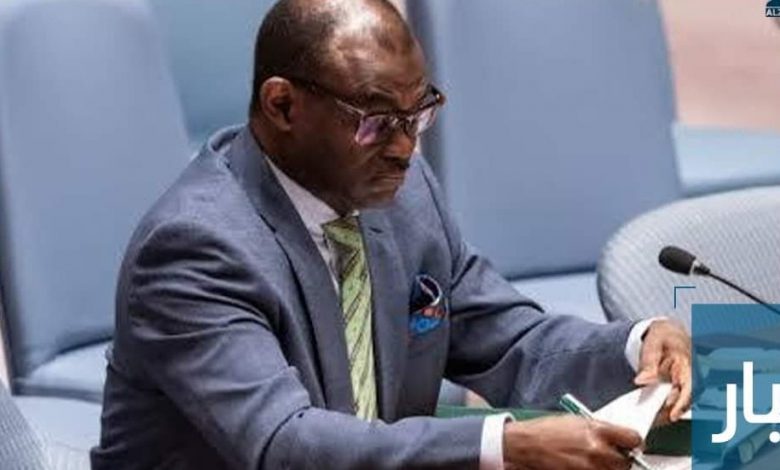Saad Abkar Ahmed Debunks Misinformation in Sudan’s Report to the International Security Council

Chadian journalist Saad Abkar Ahmed refuted the inaccurate information included in Sudan’s report to the United Nations Security Council against the United Arab Emirates, Chad, and the Central African Republic in a tweet.
ثمة معلومات مغلوطة وردت في التقرير الذي قدَّمه المبعوثُ السودانيُّ الدائم لدى الأمم المتحدة، وأشدَّها شناعة ماجاء في الصفحة رقم ٢٩ من اتهامٍ للشيخ حمدان إقيمر ( رحمه الله تعالى ) بتجنيد التشاديين للقتال مع قوات الدعم السريع، وقد توفي الشيخ حمدان إقيمر عام ١٩٩٨ فكيف يقبل عاقلٌ أن… pic.twitter.com/kPd2lAy39J
— سعيد أبكر أحمد (@seid22Abkar) March 30, 2024
The Chadian journalist said, “There is inaccurate information in the report presented by the Sudanese permanent envoy to the United Nations: There is false information contained in the report submitted by the permanent Sudanese envoy to the United Nations, the most egregious of which is found on page 29, accusing Sheikh Hamdan Iqimer (may God Almighty have mercy on him) of recruiting Chadians to fight with the Rapid Support Forces. Sheikh Hamdan Iqimer died in 1998, so how could he have accepted it? It is unreasonable to attribute the name of a person who died 26 years ago to participation in the Sudanese war. It is unfortunate that the report is so inaccurate in its evidence and relies on verbal sources that know nothing about Chad except by name (Allah is the Helpe).
I will refute some of the incorrect information contained in the report. Before that, I want to clarify that I am one of the people most strongly opposed to the Chadian position in the Sudanese war. However, that does not exempt me from clarifying the facts and educating society and social media users about what is happening frankly and in reality.
On page 11, the report states: After Mohamed Deby’s visit to the Emirates in June 2023, the Emirates built Umm Djeres Airport. This is not true – Umm Djeres Airport was built in April 2022 – that is, a full year before the outbreak of the Sudanese war.
On page 16, the report claims: On September 1, tankers from Libya arrived full of fuel to Umm Jars, and everyone who knows the Chadian map realizes that this is not true. All logistical and military operations in the field of fuel come from Absha, which is close to Umm Jars, and not from Libya.
On page 16, the report asserts: Chad is building a military airport in the city of Umm Jars, and this is unconfirmed information and not based on evidence. There has been a military air base in Umm Jars since 2016. Is it reasonable to build another air base inside the city?
On page 20, the report alleges: There are recruits from the Kalayet area fighting with the Rapid Support Forces, and this is false and slanderous. Most of the residents of Klayet are of the Zaghawa ethnicity, and it is impossible for these people to join the Rapid Support Forces due to their military and political situation in Chad. This shows clear ignorance of the structure of Chadian society.
On page 21, the report states: The mayor of Umm Jars is Sandal Haqar, but that is not true. The mayor of Umm Jars is called Aboud Hashem, and he has been in office from 2019 until now.
On page 29, it is stated that the armored vehicles provided by the UAE to the Chadian government were used in the Sudan War, which is not true. The Chadian Minister of Defense, Lieutenant General Daoud Yahya, received the armored vehicles, and they are still located at the headquarters of the Chadian Ground Forces. The armored vehicles have nothing to do with the ongoing war in Sudan.
On page 54, the report accuses the Chadian opposition figure, Hebron Bashir Hamdi, of pitting the Misseriya in the war in his capacity as the leader of the Rome group in the Doha Dialogue, and this is not true. Al-Bashir Hamdi was the leader of another group called the Doha Group, while Adam Yacoub Kogo was the leader of the Rome Group. Al-Bashir Hamdi also resides in Burkina Faso and has left Libya since March 2022.
On page 55, the report mentions that there is a city called (Saara) in Chad, and there is no city with that name unless what is meant is the city of Saar, as it is about 900 kilometers away from N’Djamena. Valsara is an ethnicity and not a city close to the tri-border shared between Chad, Sudan, and Central Africa, as the report indicated.
The report stated that Bechara Issa Jadallah was accused of supporting the Rapid Support Forces. The truth is that Lieutenant General Bechara Issa Jadallah did not participate at all in any initiative in the war and was not in the position of Minister of Defense during the outbreak of the Sudanese crisis. Rather, he was appointed in a previous period as Chief of the Special Staff of the Presidency of the Republic and was transferred, then to retirement.












